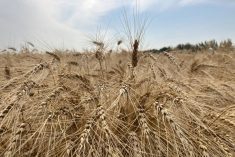Mexico City | Reuters — Chicago grains and soy ended the week higher on Friday as hopes dimmed for the renewal of a U.N.-brokered deal allowing the safe Black Sea exports of Ukraine grain.
Ukraine, Russia, Turkey and the United Nations failed to reach an agreement to authorize any new vessels to carry out Black Sea grain exports on Friday, deputy UN spokesperson Farhan Haq said.
The most-active wheat and corn futures contracts made their first weekly gains in three weeks, coming off two-year and nine-month lows, respectively. Russia has said it will not extend the Black Sea pact beyond May 18 unless its list of demands over its food and fertilizer exports is met.
Read Also

U.S. livestock: Feeder cattle hit contract highs on tight supply
Chicago | Reuters – All Chicago Mercantile Exchange feeder cattle futures and most live cattle futures hit contract highs on…
“The Russians are giving no indication that they are budging on the corridor extension,” said Charlie Sernatinger, head of grains for Marex Capital, in an analyst note.
The pace of grain shipments from Ukraine under the initiative has slowed as concerns grow over ships getting stuck if a deal is not renewed, according to sources and data.
The most-active wheat contract on the Chicago Board of Trade (CBOT) gained 15-1/4 cents to settle at $6.60-1/4 a bushel, after dipping this week to the lowest since April 2021.
Corn ended 7-1/2 cents higher at $5.96-1/2 a bushel. In the week, it rose 2.1 per cent after sinking to its lowest since July 25, 2022, on Wednesday.
Soybeans settled up 18-3/4 cents at $14.36-1/2 a bushel, after touching a low not seen since October earlier in the week.
Markets were looking ahead to a U.S. crop condition report on Monday, deficit negotiations in Washington and a monthly U.S. crop production report on May 12.
“We’ve got issues with lack of selling by the producer because it’s planting season, we’ve got the debt ceiling concern and we have a crop report that’s going to come out next Friday, expected to be negative,” said Don Roose, president of Iowa-based U.S. Commodities.
— Reporting for Reuters by Cassandra Garrison in Mexico City and Naveen Thukral in Singapore.
















